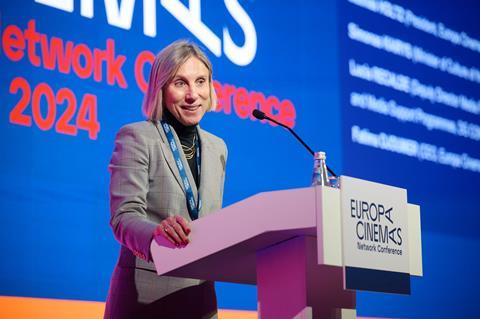
Cinema funding, the popularity of classic films and involving young audiences in programming were among the big talking points at Europa Cinemas’s annual conference, held in Lithuania over the weekend.
Over 500 delegates travelled to Vilnius for the European exhibition network’s event. Europa Cinemas comprises a network of 1,263 cinemas and 3,121 screens in 39 countries.
The future funding for the Europa Cinemas network was addressed in an opening speech by Lucia Recalde, head of the European Union’s Creative Europe MEDIA unit.
The network currently receives €15m annually as part of the current Creative Europe programme, which ends in 2027.
“Europe is facing a lot of challenges and the financial framework that we start in 2027 will have to reflect those challenges coming from the defence to the reconstruction of Ukraine. There will be increased pressures on the [EU’s] budget,” Recalde noted.
“But we are confident and believe that we can work hand in hand with Europa Cinemas to secure an adequate budget for the future,” Recalde added.
“To do so, we believe that this successful programme will have to build on this success of today but also evolve and project itself into the future. And this is something you are already doing through the Europa Cinemas network which is one of the greatest successes of Creative Europe as a whole.”
Conference conclusions
In a closing session drawing conclusions from the three days of presentations and workshops, Irene Musumeci, marketing director, global at Mubi, observed that “a general trend across the conference was a big resurgence of repertory programming, particularly for classic cinema. There is a real discovery of classics for the first time by younger audiences.”
She pointed out that some cinemas are also involving young audiences to help curate their programmes. She cited the example of Mark Cosgrove, the curator of the Watershed cinema in Bristol in the UK, who has drawn on the expertise of one of the cinema’s younger staff members to put the film programme together.
Workshop discussions also showed that young audiences shouldn’t be considered as being one monolith block. “They work in different niches, have different interests, identify in a number of ways and there are different layers co-existing, so we shouldn’t make any assumptions: we should talk to them, observe them and pay attention to the data we receive about them,” Musumeci suggested.
In addition, the conference demonstrated the importance of cinemas communicating effectively and creatively with their audiences. This includes showing the internal workings and personal identity of their venues.
“A listening mode is also a phrase that resonated throughout many of the sessions,” Musumeci said. “Listening doesn’t mean that you do exactly as you’re told, but it does mean that you pay attention and that you are influenced by what happens around you [because] this listening mode is necessary for survival.”
Play was another theme to emerge, in ensuring the cinema is a welcoming place where issues can be discussed but fun can also take place.
Subscription models were analysed especially how the take-up from people in their 20s and 30s is big, with the figures dropping significantly among people in their 40s who seem to then return to cinema in their 50s and 60s.
Award winners
Meanwhile, the 2024 Europa Cinemas Awards Winners were also presented during the conference. The best programming award went to Stockholm’s Biografen Zita for its “dedication to showing a diversity of European films that reached a wide range of audiences.”
The award for Best Young Audience Activity was presented to Vilnius’ Skalvija Cinema Centre for its programme of young audience activities.
A new award for Best Entrepreneur was given to Vienna’s Stadtkino im Künstlerhaus & Admiral Kino for “amplifying the diversity of European film through new initiatives, taking on a second cinema venue in the city and constantly stepping outside of their comfort zone to reach wider audiences.”






















No comments yet